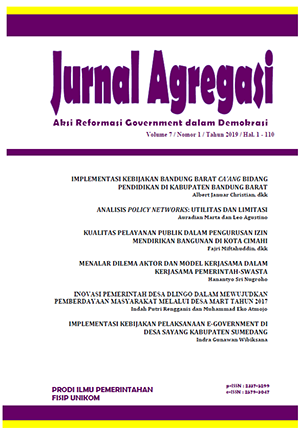Reasoning the Dilemma of the Actor and the Model of Cooperation in Public-Private Cooperation
DOI:
https://doi.org/10.34010/agregasi.v7i1.1536Keywords:
Keywords: Government-Private Cooperation, Public Service, Public GoodsAbstract
There is an alternative to cultivating bureaucracy. Therefore, the limitations of development financing are positioned as obstacles in the provision of public services. As a result, the provision of public services depends on the dynamics that occur in joint collaboration, between the government and the private sector. In reality, there is no market that is free from government intervention. On the other hand, market structuring is contrary to the paradigm of bureaucracy in public services. It becomes interesting then to see the meaning of public goods in public services and also the relation of the functions of services to economic functions from the collaboration between the government and the private sector. This research is qualitative-descriptive using desk-research. The results of this study indicate that the provision of public services can be quasi-public goods when there is an inability of the government to provide public services and the perceived imbalance from the use of public goods. In addition, the service functions and economic functions of the government-private cooperation can work together in providing public services.
Downloads
Downloads
Published
Issue
Section
License
This work is licensed under :

Creative Commons Attribution-NonCommercial 4.0 International License









